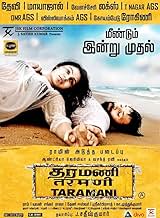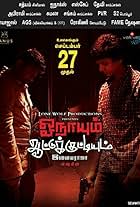Taramani
- 2017
- 2h 30m
IMDb RATING
7.4/10
1.9K
YOUR RATING
An orthodox youngster and a free-spirited lady fall in love, only to understand that they are different in all aspects of life. How do they realise their complex requirements and mistakes?An orthodox youngster and a free-spirited lady fall in love, only to understand that they are different in all aspects of life. How do they realise their complex requirements and mistakes?An orthodox youngster and a free-spirited lady fall in love, only to understand that they are different in all aspects of life. How do they realise their complex requirements and mistakes?
- Director
- Writer
- Stars
- Awards
- 3 wins & 4 nominations
- Director
- Writer
- All cast & crew
- Production, box office & more at IMDbPro
Storyline
Featured review
Director Ram prefaces Taramani as a knot of unconnected events and so may be meaningless. (மொட்டைத் தலைக்கும் முழங்காலுக்கும் முடிச்சு). The film gets into extremes of almost everything. It portrays the relationship of a street dweller with an upper middle class single mother. It tries to portrays the lights of feminism amidst societal norms. Money gets drawn parallel to honesty. Opportunism is brought in against sincerity. Globalisation versus anti-globalization and self sufficiency. It is a kind of overkill and problem gets widened just because everything is a conflict. Everything gets pardoned and forgiven and you are at peace.
A popular phrase in literary appreciation is "Let the story travel by itself. Let the characters speak!". The problem with Ram's films is; he will be seen throughout the film. It's not just traces, sometimes he gets over the top. In Taramani, he himself acknowledges that and passes on comments and directs the audience (he compares this with Facebook\twitter status messages). If the director of a film in its course comments at the response of audience like "If you haven't questioned globalization, don't question this character!", it is indeed an insult to the audience. If an insult is Ram's primary intention, it is fine. If he aims at questioning the (globalization) ideology of viewers, then he should revisit his theories of a creative art. The experience of Taramani gets established in the preface itself. We will have to experience a satsang or gospel (or a bit of both since the protagonist is an Anglo Indian) except for the fact that you are force fed with life lessons than religious lessons.
A feminist should live on her own. A cliché from Balachander days is also taken over in Taramani. Feminism has been treated differently in the past two decades. We have seen Kalyana Agathigal, Magalir mattum, Marupadiyum, 16 vayathinile etc. There is a subtle difference between feminism and misandry. Unfortunately all the feminist films try to portray hatred for men rather than feminism. If you are a woman and earn 80K/month; man is dependent on you and on a tussle if you can throw him out of the house (saying I am feeding you), what is the kind of feminism you are trying to disclose? You just go on and prove that the control or fight over couples should be mostly on financial front. There is an interesting character in Taramani; a cop's wife. She gets ill treated by her husband. She tries to get over the trauma via books. She reads "Asuran" which is all about injustice to a totem. So, even literally, you are not getting over the hatred.
The urban globalized world is in a transformation. You get confused with a lot of principles. The protagonist's friend goes to a pub, dances with other men when her husband watches her dancing. The friend says, you just have to throw biscuits at these dogs at the right time. There is a higher class lady, who wants to sleep with a stranger, loses her wedding ring. She sleeps with the police commissioner for getting the ring back! It's all Ram Ram!! No character gets committed to a relationship. In the idea of breaking the stereotypes, all the goodness in the conventional wisdom gets totally erased. In that sense, it is a regressive movie to the larger extent.
Taramani is verbally angry at urbanization and birds losing their habitat. Taramani tries to bring out negative shades of urban lives and their insecurities. Taramani disguises itself as a feminist art. Those said and done, dialogues stand out and are emotional. Andrea's best performance till date. Barnabas and his forgiveness add the grace and ray of hope. Though it may seem as a film for matured audience, Taramani just tries to tie a knot between extremes of unconnected entities; which for all its practical difficulties is very rare. Taramani is just a gooey film with a confused core!
A popular phrase in literary appreciation is "Let the story travel by itself. Let the characters speak!". The problem with Ram's films is; he will be seen throughout the film. It's not just traces, sometimes he gets over the top. In Taramani, he himself acknowledges that and passes on comments and directs the audience (he compares this with Facebook\twitter status messages). If the director of a film in its course comments at the response of audience like "If you haven't questioned globalization, don't question this character!", it is indeed an insult to the audience. If an insult is Ram's primary intention, it is fine. If he aims at questioning the (globalization) ideology of viewers, then he should revisit his theories of a creative art. The experience of Taramani gets established in the preface itself. We will have to experience a satsang or gospel (or a bit of both since the protagonist is an Anglo Indian) except for the fact that you are force fed with life lessons than religious lessons.
A feminist should live on her own. A cliché from Balachander days is also taken over in Taramani. Feminism has been treated differently in the past two decades. We have seen Kalyana Agathigal, Magalir mattum, Marupadiyum, 16 vayathinile etc. There is a subtle difference between feminism and misandry. Unfortunately all the feminist films try to portray hatred for men rather than feminism. If you are a woman and earn 80K/month; man is dependent on you and on a tussle if you can throw him out of the house (saying I am feeding you), what is the kind of feminism you are trying to disclose? You just go on and prove that the control or fight over couples should be mostly on financial front. There is an interesting character in Taramani; a cop's wife. She gets ill treated by her husband. She tries to get over the trauma via books. She reads "Asuran" which is all about injustice to a totem. So, even literally, you are not getting over the hatred.
The urban globalized world is in a transformation. You get confused with a lot of principles. The protagonist's friend goes to a pub, dances with other men when her husband watches her dancing. The friend says, you just have to throw biscuits at these dogs at the right time. There is a higher class lady, who wants to sleep with a stranger, loses her wedding ring. She sleeps with the police commissioner for getting the ring back! It's all Ram Ram!! No character gets committed to a relationship. In the idea of breaking the stereotypes, all the goodness in the conventional wisdom gets totally erased. In that sense, it is a regressive movie to the larger extent.
Taramani is verbally angry at urbanization and birds losing their habitat. Taramani tries to bring out negative shades of urban lives and their insecurities. Taramani disguises itself as a feminist art. Those said and done, dialogues stand out and are emotional. Andrea's best performance till date. Barnabas and his forgiveness add the grace and ray of hope. Though it may seem as a film for matured audience, Taramani just tries to tie a knot between extremes of unconnected entities; which for all its practical difficulties is very rare. Taramani is just a gooey film with a confused core!
- gganesh-93114
- Aug 19, 2017
- Permalink
- How long is Taramani?Powered by Alexa
Details
- Runtime2 hours 30 minutes
- Color
- Aspect ratio
- 2.35 : 1
Contribute to this page
Suggest an edit or add missing content



























